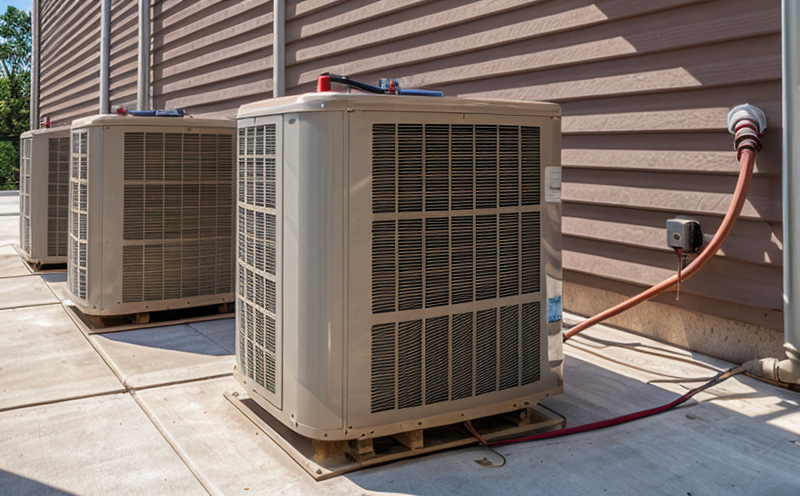ASHRAE 41.2-2021 HVAC Component Testing
The ASHRAE 41.2-2021 standard provides a robust framework for testing HVAC (Heating, Ventilation, and Air Conditioning) components to ensure they meet stringent performance criteria that align with modern building codes and energy efficiency requirements. This service is critical for quality managers, compliance officers, R&D engineers, and procurement teams in the building & infrastructure sector who need to verify that their HVAC systems are efficient and reliable.
The ASHRAE 41.2-2021 standard covers a wide range of tests including but not limited to static pressure drop, airflow resistance, and sound power level measurements for various components such as air filters, dampers, grilles, and diffusers. This comprehensive testing ensures that these components perform optimally under real-world conditions. For instance, the test procedures ensure that air filters do not significantly impede air flow while still providing effective particulate removal.
Compliance with ASHRAE 41.2-2021 is crucial for several reasons. It helps manufacturers produce products that meet or exceed energy efficiency standards set by regulatory bodies like the U.S. Department of Energy (DOE). This not only enhances operational efficiency but also contributes to environmental sustainability by reducing energy consumption and greenhouse gas emissions.
The testing process involves meticulous preparation of test specimens, which is a critical step in ensuring accurate results. For air filters, this may include conditioning them under specific humidity and temperature conditions before the performance tests. The apparatus used for these tests includes calibrated manometers, sound level meters, and other precision instruments designed to measure key performance indicators accurately.
One of the most important aspects of ASHRAE 41.2-2021 is its focus on repeatability and reproducibility of test results. This ensures that any component tested under this standard will perform consistently across different environments, which is essential for quality assurance in HVAC systems.
- Static pressure drop
- Airflow resistance measurement
- Sound power level determination
- Thermal efficiency analysis
These tests are not just theoretical exercises but have real-world implications. For instance, accurate static pressure drop measurements can help in optimizing the overall system design and ensuring that air is distributed evenly throughout a building. Similarly, sound power level determinations are crucial for minimizing noise pollution, which is particularly important in residential settings.
In addition to meeting regulatory requirements, compliance with ASHRAE 41.2-2021 can also provide significant competitive advantages. It demonstrates a commitment to quality and innovation that can enhance the reputation of manufacturers and contractors. This can lead to increased market share as consumers increasingly value eco-friendly and energy-efficient solutions.
The standard's emphasis on reliability and performance under real-world conditions ensures that HVAC components are robust enough to withstand various operating conditions, thereby extending their lifespan and reducing maintenance costs in the long run.
Benefits
Compliance with ASHRAE 41.2-2021 offers numerous benefits, including:
- Enhanced Efficiency: Ensures that HVAC components operate efficiently, thereby reducing energy consumption.
- Safety Assurance: Guarantees the safety and reliability of HVAC systems in critical environments such as hospitals and data centers.
- Regulatory Compliance: Helps organizations meet stringent regulatory requirements set by government agencies.
- Market Advantage: Enhances a company's reputation for quality, which can lead to increased market share and customer loyalty.
In addition to these tangible benefits, compliance also fosters innovation within the industry. By setting high performance standards, ASHRAE 41.2-2021 encourages manufacturers to develop cutting-edge technologies that push the boundaries of what is possible in HVAC systems.
Furthermore, it promotes a culture of continuous improvement by encouraging regular updates and refinements to testing protocols as new technologies emerge. This ensures that the standard remains relevant and effective even as building needs evolve over time.
Quality and Reliability Assurance
Ensuring quality and reliability in HVAC components is paramount, especially considering their critical role in maintaining indoor air quality and energy efficiency. ASHRAE 41.2-2021 plays a pivotal role in achieving these objectives through its rigorous testing procedures.
- Calibration: All instruments used in the testing process are meticulously calibrated to ensure accuracy.
- Conditioning: Specimens undergo conditioning to simulate real-world operating conditions, ensuring that test results reflect actual performance.
- Repeatability: The standard emphasizes the importance of consistent and reproducible test results across different environments.
- Documentation: Comprehensive documentation is maintained for each test run, including detailed descriptions of specimen preparation and testing conditions.
The reliability of ASHRAE 41.2-2021 lies in its ability to provide a standardized approach that can be universally applied across different manufacturers and regions. This standardization ensures that HVAC components meet the same rigorous performance criteria regardless of where they are manufactured or installed.
By adhering to these stringent testing protocols, organizations can ensure that their HVAC systems perform reliably under various conditions. This not only enhances operational efficiency but also contributes to environmental sustainability by reducing energy consumption and greenhouse gas emissions.
Competitive Advantage and Market Impact
The ASHRAE 41.2-2021 standard significantly impacts the competitive landscape in the building & infrastructure sector, particularly for HVAC component manufacturers and contractors. Compliance with this standard provides several key advantages:
- Regulatory Assurance: Ensures that products meet or exceed regulatory requirements set by government agencies.
- Quality Reputation: Establishes a reputation for quality and reliability, enhancing customer trust and satisfaction.
- Innovation Incentive: Encourages continuous improvement and innovation within the industry.
- Market Access: Opens up access to new markets by demonstrating compliance with internationally recognized standards.
The standard's rigorous testing procedures ensure that HVAC components are robust enough to withstand various operating conditions, thereby extending their lifespan and reducing maintenance costs. This reliability is particularly important in critical environments such as hospitals and data centers where system downtime can have severe consequences.
Moreover, compliance with ASHRAE 41.2-2021 helps organizations differentiate themselves from competitors by offering products that meet the highest quality standards. This differentiation can be a significant factor in winning contracts and gaining market share.





